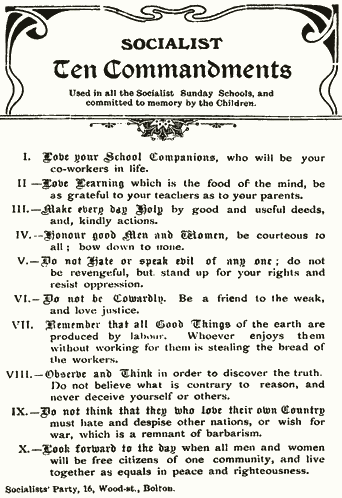| Socialism
and Christianity are irreconcilable. One is based on
the atheistic philosophy found in the Communist
Manifesto; the other is based on the deity of Jesus
Christ.
Anyone who doubts
that the Communist Manifesto is also a socialist
manifesto need only read Frederick Engels' preface
to the 1888 edition, which declares that the
Communist Manifesto "is undoubtedly the most
widespread, the most international production of all
Socialist literature, the common platform
acknowledged by millions of working men from Siberia
to California."
But why wasn't it
called a "Socialist Manifesto" instead?
According to Engels, "Socialism was, in 1847, a
middle-class movement, Communism a working-class
movement .... And as our notion, from the very
beginning, was that 'the emancipation of the working
class must be the act of the working class itself,'
there could be no doubt as to which of the two names
we must take."
Socialism means
economic control of the people by government. In a
socialist country, the state is all-powerful. Such
an all-powerful state views itself — and not God
— as the ultimate authority. It is not surprising,
therefore, that the Communist Manifesto calls for
abolishing family, marriage, countries, and religion
as well as private property. Under the socialist
system the state determines what is right and wrong
— without any competing loyalties to God, family,
or country.
Karl Marx, the
principal author of the Communist Manifesto, once
called religion "the opium of the people."
Marx viewed man as mere matter that can be shaped,
and perfected, by his external environment. How
different this is from the Christian view that man
has an eternal soul and is responsible for his own
actions!
It is impossible for
a true Christian to be a socialist or for a true
socialist to be a Christian. Nevertheless,
socialists have cleverly twisted the scriptures in
order to make their materialistic philosophy appear
Christian. As Marx explained in the Communist
Manifesto: "Nothing is easier than to give
Christian asceticism a Socialist tinge. Has not
Christianity declaimed against private property,
against marriage, against the State? Has it not
preached, in the place of these, charity and
poverty, celibacy and mortification of the flesh,
monastic life and Mother Church."
-- by Gary
Benoit

[1912
Postcard]
Socialist
Sunday Schools
Socialist Sunday
Schools in Great Britain arose in response to a
widespread feeling as to the inadequacy of the
orthodox Sunday Schools as a training ground for the
children of Socialists and of the need for some
organised and systematic method of presenting the
Socialist point of view and of teaching the ideals
and principles of Socialism to the children, youths
and maidens in the country. The main purpose being
to supply the Socialist movement with fearless,
capable and conscientious thinkers.
Mrs Mary Gray, a
member of the Social Democratic Federation, who ran
a soup kitchen for the children of the Dock strike,
inititated the Socialist Sunday School in 1892. Her
aim, on realising they had little or no education,
was to influence and educate them and make them
aware of their socialist responsibilities and
provide what was lacking in their day schools. She
started the first Sunday with only one other besides
her own two children but twenty years later there
were approximately one hundred and twenty schools
throughout the country, twenty of them being in
London itself.
A national movement,
the National Council of British Socialist Sunday
Schools Union, formed in 1909, however, traces its
origin to a school opened in Glasgow by Caroline
Martyn and Archie McArthur. It was established as a
protest against, and an alternative to, the
perceived middle-class bias and assumptions of the
regular churches. Its aims were to help the schools
in their teaching of Socialism. The schools were
grouped in District Unions and for the first ten
years were affiliated to the Council. However in
1920 the Constitution was amended to allow direct
school affiliation which meant there was wide
representation at the Annual Conference. The manual
is a very enlightening book into the teachings of
the Sunday Schools and was prepared chiefly for the
use of teachers. It contains specimen lessons and
technique help to the teachers together with
suggested reading for Socialist Education.
It was the view that
public education should be secular and Socialist
Sunday Schools were for purely educational bodies
and therefore the hymns did not have theological
tendencies or the Christian dogma which was preached
in religious churches of the day. They worked in
close harmony with the Labour Movement and were
concerned with the spiritual and social objective of
the human race with regard to daily life and
conduct.
[source] |